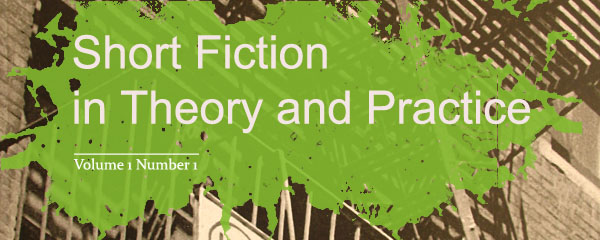
by Ailsa Cox
Down in the basement, a boy creeps into a disused lab. He sniffs. Is there a smell of something? He turns on a tap – and that’s where he’ll have to stay. Harry is in the story I’m writing, or rather chipping away at, before I turn to other business – short story business for the most part, because April’s been a busy month. Shortlisting’s underway for the Edge Hill Prize; last year’s winner, Jeremy Dyson, came up to give a reading and talk to the students. I was an organiser of the Figure of the Author short story conference at the University of Angers, with Toby Litt and Charles E. May as speakers. The book I edited, Teaching the Short Story, was finally published after many years’ gestation. And March 31st was the deadline for submissions to Issue 2 of Short Fiction in Theory & Practice.
When Intellect Press approached me a couple of years ago, it seemed obvious to me that there was a space for a new short story journal. Not a short story magazine – when you’re trying to get a story published there are never enough, but in fact there are magazines coming and going all the time. I co-edited one of those, Metropolitan, with Elizabeth Baines, a few years ago. What I wanted was a forum for short story writers who were also thinking critically about the form and about their own practice, aesthetic, poetics – call it what you will.
Many of those people are based in universities, though they need not necessarily be so. The development of creative writing at MA, MFA and PhD level has moved the conversation away from ‘craft‘ and the ‘how to’ manual. While the long-established Journal of the Short Story in English publishes author interviews alongside essays by literary scholars, there hasn’t really been anything for this new type of readership. I also wanted something that would reflect confidence in the short story. Okay, we know it’s a minority pursuit, but let’s stop being so cranky about it, always looking over our shoulder at the novel and complaining that nobody loves us. Let’s stop always trying to define what a short story is – something we’ve been trying to do, and ultimately failing, since Edgar Allan Poe. Instead of fencing off the short story, let’s celebrate its diversity. So we are interested in both ‘literary’ and ‘popular’ forms, in translation and in cross-media work, in short shorts and long stories, novellas and hypertext and anything else you can think of.

The journal is peer-reviewed, which means that each submission is sent anonymously to two members of the editorial board for recommendation. Very few articles are accepted for any peer-reviewed journals without some kind of revision suggested either by the reviewers and/or editorial input. The advantage of peer review is that it sets a standard for the journal, and raises the status of the contributions. If they work as academics or are hoping to, it means they’ve scored research points. Sometimes the verdict of the reviewers isn’t what you’d like to hear, especially when you’ve been encouraging the author to submit, but it is important to place your trust in their judgement.
I wish we could do without this word ‘academic’, with its overtones of fustiness and obscurity. I hope we are not academic in that sense. Our first issue, launched in February, can be downloaded free. Amongst other things, it includes essays on the Canadian writer Clark Blaise; J.G. Ballard and the short story sequence; flash fiction and the historical story; and on the interplay of advertisements, author photographs and text in the magazines which published writers such as Edith Wharton and Katherine Mansfield – a legacy which has implications for the status of the contemporary short story in the marketplace. There is an interview with Helen Simpson and an article on ‘SciFi Strange’ which includes a dialogue with Michael Moorcock. There are also long reviews of collections by Belle Boggs, T.C. Boyle, Graham Mort and Wena Poon. The publisher, Intellect, are very design conscious and they have a young, enthusiastic team who are redefining the look and the feel of the peer-reviewed journal.
It was thanks to Jelena, at Intellect, that we came up with the idea of basing a small section of each issue around a specific story, partly to encourage new, inexperienced contributors to have a go, and giving us the chance to include pieces that were shorter than the standard length. As a member of our advisory board, Charles May nominated Gogol’s ‘The Overcoat’ for our second issue. I’m looking through these, and the other submissions, now, carefully logging and sending them off for peer review, whilst also publicising the first issue, with the help of the associate editors Alan Wall and Alison MacLeod, and our new Facebook Group editor, Nikki Mitchell.
Like all editing, putting a journal together can be a slog especially when it comes to the minutiae of referencing, house style and proofs. Does it really matter, T.C. or T. C.? Which should it be, SciFi or sci fi? Everything always takes much longer than you think, and the editorial cycle, from the call for papers to promoting the journal, never stops turning. So far the reception has been fantastic – short story writers and readers are nothing, if not enthusiastic! Let me know what you think.


Thanks to all of you for those nice comments! We are open to submissions for the journal and please do send in articles or ideas for reviews and interviews. I’ve been into the lab and out again, and this morning I was briefly at the Traffic Light Disco. Wonderful, the places you can visit as a writer (though not in real life….)
Thank you for this highly informative article – giving us a sense of the context and intention of the journal. I hope you manage to get back to the laboratory scene in the not too distant future!
It’s a wonderful journal, Ailsa. I am throughly enjoying it and finding lots of quotable quotes. Thank you!
Hi Lynda,
Ailsa’s book Teaching the Short Story is now available from Amazon in hardback and paperback. Here’s the link to the paperback version: http://www.amazon.co.uk/Teaching-Short-Story-New-English/dp/0230573703/ref=sr_1_4?s=books&ie=UTF8&qid=1306253074&sr=1-4#_ .
Hi Ailsa,
Is you book, Teaching the Short Story, available to buy?